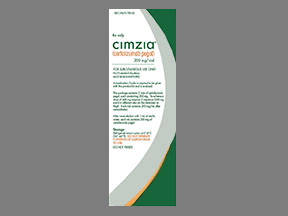
Cimzia Coupons & Savings Card – Discount Prices from $6508.48
My prescription
Edit
2 X 200MG, Cimzia (1 Kit)
Select pharmacy

Albertsons
$6508.48
COUPON PRICE
Walgreens
$6530.78
COUPON PRICE
Walmart
$6546.28
COUPON PRICECimzia savings card
Show this card to your pharmacist
Albertsons
$6508.48
BIN
ID
PCN
GRP
019876
LH2F0C6BDA
CHIPPO
LHX
Powered by
Related TNF blockers prescriptions
More prescriptions for rheumatoid arthritis
Related TNF blockers prescriptions
More prescriptions for rheumatoid arthritis
Price history for Cimzia
1 Kit, 2 X 200MG
Average retail price for Cimzia
Average SaveHealth price for Cimzia
Our price history data is based on aggregated prescription data collected from participating pharmacies in America. Our prescription data updates daily to reflect the latest price changes. If you notice a missing data point, it means there wasn't sufficient data available to generate a monetary value for that date.
*Retail prices are based on pharmacy claims data, and may not be accurate when we don't have enough claims.
Cimzia dosage forms
Dosage Quantity Price from Per unit 2 X 200MG 1 Kit $6508.48 $6508.48
| Dosage | Quantity | Price from | Per unit |
|---|---|---|---|
| 2 X 200MG | 1 Kit | $6508.48 | $6508.48 |
What does CIMZIA do to the body?
CIMZIA (certolizumab pegol) is a medication that works by inhibiting tumor necrosis factor-alpha (TNF-alpha), a substance in the body that causes inflammation. By blocking TNF-alpha, CIMZIA helps reduce inflammation and alleviate symptoms associated with certain autoimmune conditions, such as rheumatoid arthritis, Crohn's disease, and psoriatic arthritis. This can lead to decreased pain, swelling, and improved physical function in affected individuals.
Is CIMZIA a high risk medication?
Cimzia (certolizumab pegol) is not classified as a high-risk medication, but it does carry certain risks and potential side effects. It is important for patients to be monitored regularly by their healthcare provider while using Cimzia, as it can increase the risk of infections and may have other side effects. Patients should discuss their medical history and any concerns with their healthcare provider to ensure it is appropriate for their condition.
Does CIMZIA cause weight gain?
Cimzia (certolizumab pegol) is not commonly associated with weight gain as a side effect. However, individual responses to medication can vary, and some patients may experience changes in weight. If there are concerns about weight changes while taking Cimzia, it is advisable to consult with a healthcare provider for personalized advice and management.
Does CIMZIA have a black box warning?
Yes, Cimzia (certolizumab pegol) has a black box warning. It warns about the increased risk of serious infections, including tuberculosis, bacterial sepsis, invasive fungal infections, and other opportunistic infections that may lead to hospitalization or death. Additionally, there is a warning about the potential risk of malignancies, including lymphoma, in children and adolescents treated with tumor necrosis factor (TNF) blockers. It is important for patients to discuss these risks with their healthcare provider.
Does CIMZIA cause fluid retention?
Cimzia (certolizumab pegol) can potentially cause fluid retention as a side effect, although it is not one of the most common side effects. Patients experiencing symptoms of fluid retention, such as swelling in the extremities or sudden weight gain, should consult their healthcare provider for further evaluation and management.
